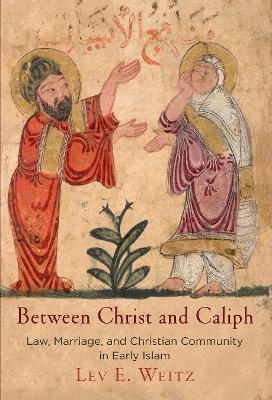
Between Christ and Caliph
Law, Marriage, and Christian Community in Early Islam
Seiten
2018
University of Pennsylvania Press (Verlag)
978-0-8122-5027-5 (ISBN)
University of Pennsylvania Press (Verlag)
978-0-8122-5027-5 (ISBN)
In the conventional historical narrative, the medieval Middle East was composed of autonomous religious traditions, each with distinct doctrines, rituals, and institutions. Outside the world of theology, however, and beyond the walls of the mosque or the church, the multireligious social order of the medieval Islamic empire was complex and dynamic. Peoples of different faiths—Sunnis, Shiites, Christians, Jews, and others—interacted with each other in city streets, marketplaces, and even shared households, all under the rule of the Islamic caliphate. Laypeople of different confessions marked their religious belonging through fluctuating, sometimes overlapping, social norms and practices.
In Between Christ and Caliph, Lev E. Weitz examines the multiconfessional society of early Islam through the lens of shifting marital practices of Syriac Christian communities. In response to the growth of Islamic law and governance in the seventh through tenth centuries, Syriac Christian bishops created new laws to regulate marriage, inheritance, and family life. The bishops banned polygamy, required that Christian marriages be blessed by priests, and restricted marriage between cousins, seeking ultimately to distinguish Christian social patterns from those of Muslims and Jews. Through meticulous research into rarely consulted Syriac and Arabic sources, Weitz traces the ways in which Syriac Christians strove to identify themselves as a community apart while still maintaining a place in the Islamic social order. By binding household life to religious identity, Syriac Christians developed the social distinctions between religious communities that came to define the medieval Islamic Middle East. Ultimately, Between Christ and Caliph argues that interreligious negotiations such as these lie at the heart of the history of the medieval Islamic empire.
In Between Christ and Caliph, Lev E. Weitz examines the multiconfessional society of early Islam through the lens of shifting marital practices of Syriac Christian communities. In response to the growth of Islamic law and governance in the seventh through tenth centuries, Syriac Christian bishops created new laws to regulate marriage, inheritance, and family life. The bishops banned polygamy, required that Christian marriages be blessed by priests, and restricted marriage between cousins, seeking ultimately to distinguish Christian social patterns from those of Muslims and Jews. Through meticulous research into rarely consulted Syriac and Arabic sources, Weitz traces the ways in which Syriac Christians strove to identify themselves as a community apart while still maintaining a place in the Islamic social order. By binding household life to religious identity, Syriac Christians developed the social distinctions between religious communities that came to define the medieval Islamic Middle East. Ultimately, Between Christ and Caliph argues that interreligious negotiations such as these lie at the heart of the history of the medieval Islamic empire.
Lev E. Weitz teaches history and directs the Islamic World Studies program at the Catholic University of America.
| Erscheinungsdatum | 10.07.2018 |
|---|---|
| Reihe/Serie | Divinations: Rereading Late Ancient Religion |
| Zusatzinfo | 6 illus. |
| Verlagsort | Pennsylvania |
| Sprache | englisch |
| Maße | 152 x 229 mm |
| Themenwelt | Geschichte ► Allgemeine Geschichte ► Mittelalter |
| Geschichte ► Teilgebiete der Geschichte ► Militärgeschichte | |
| Recht / Steuern ► Rechtsgeschichte | |
| ISBN-10 | 0-8122-5027-3 / 0812250273 |
| ISBN-13 | 978-0-8122-5027-5 / 9780812250275 |
| Zustand | Neuware |
| Informationen gemäß Produktsicherheitsverordnung (GPSR) | |
| Haben Sie eine Frage zum Produkt? |
Mehr entdecken
aus dem Bereich
aus dem Bereich
eine neue Geschichte des Mittelalters
Buch | Hardcover (2023)
C.H.Beck (Verlag)
CHF 53,20


